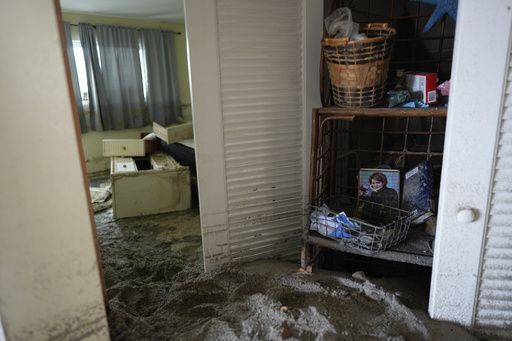BRADENTON BEACH, Fla. — As Florida braces for the impacts of hurricanes, residents often focus on the dangers of intense winds, heavy rainfall, and overwhelming storm surges. However, in the wake of Hurricane Helene and Hurricane Milton’s strikes on the Gulf Coast, many are grappling with an unexpected byproduct: an overwhelming accumulation of sand.
In just under two weeks, these storms brought storm surges reaching heights of up to 10 feet (3 meters), inundating communities with sand—some areas seeing piles of 5 feet (1.5 meters) or even more. While the fine, white sand is a hallmark of Florida’s beautiful beaches, it has become a significant burden for homeowners and local governments trying to recover from the devastation.
Scott Bennett, a recovery contractor with experience from Hurricane Katrina in 2005, expressed his disbelief at the situation: “I’ve never seen sand like this. Wind, rain, water, but never sand.” The aftermath of Hurricane Milton left Bradenton Beach, located about an hour south of Tampa, resembling a scene from a snowstorm, with roadways lined with sandbanks that towered a couple of feet high, encircling local homes.
Jeremi Roberts, a member of the State Emergency Response Team, compared the challenge to winter weather up north, stating, “It’s like getting 4 to 6 feet (1.2 to 1.8 meters) of snow.” Further south, Ron and Jean Dyer described how the storms deposited nearly 3 feet (0.9 meters) of sand against their condominium on Venice Island, emphasizing, “The beach just moved over everything.”
After Hurricane Helene, volunteers spent two days clearing sand from the condo’s pool, only for Hurricane Milton to refill it shortly after. Ron Dyer recounted, “They just kept digging and wheeling … now we have to do it all over again.” According to Larry West, a storm recovery contractor, his company will incur around $300,000 in costs just to clear sand and debris from one condo building in Manasota Key, approximately 35 miles (56 kilometers) south of Sarasota. Many property owners, especially those lacking flood insurance, will face significant out-of-pocket expenses to address this cleanup.
“The poor homeowner who’s going to have to spend $150,000 cleaning up, that’s going to hurt them hard,” West noted. He expressed uncertainty about where to take the sand, as local parks designated for disposal were already overwhelmed. Currently, two drop-off sites remain available, but West remarked, “Right now I’m building mountains in their parking area.”
In Pinellas County, which includes St. Petersburg, officials are assessing the damage but estimate that around 1 million cubic yards (765,000 cubic meters) of sand have been lost. Public Works Director Kelli Hammer Levy emphasized the magnitude of this loss, stating, “A lot of volume has been lost, and that’s our main concern here right now.” For context, a 2018 beach restoration project to replenish the coastline with 1.3 million cubic yards (994,000 cubic meters) of sand cost over $50 million.
Levy remains optimistic that much of the displaced sand can be reused, urging residents to return clean sand to the beach. However, she cautioned against contamination, pointing out that debris mixed in with the sand may cause complications for beach restoration efforts. The county has set up a designated location for residents to drop off sand for screening and cleaning, or disposal if necessary, in collaboration with the state’s Department of Environmental Protection.
As recovery efforts continue, many Florida residents find themselves manually removing the thick layer of sand from their properties. “Every shovelful is heavy,” noted West, underscoring the daunting task ahead. “This is horrendous, as far as the cleanup.”


